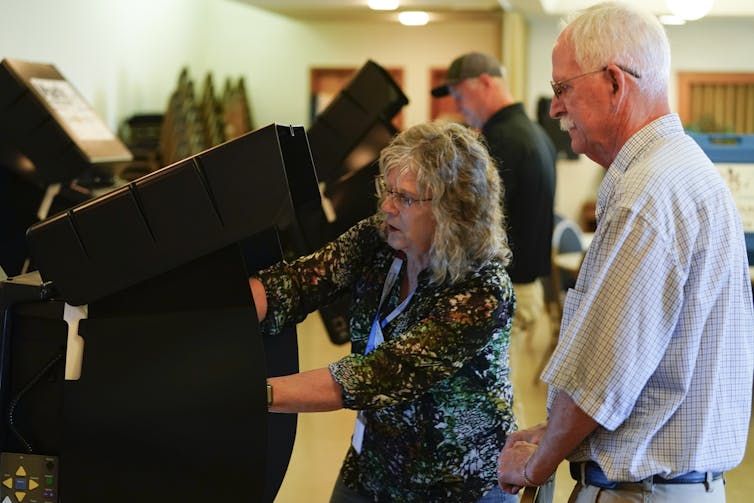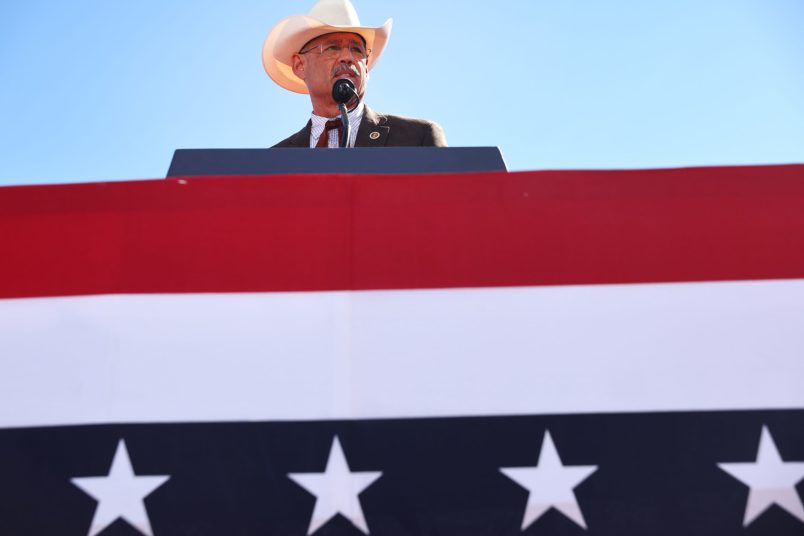This article is part of TPM Cafe, TPM’s home for opinion and news analysis. It was originally published at The Conversation.
As the U.S. moves closer to the 2022 midterm elections, a sizable number of Americans express a lack of confidence in the accuracy of the vote count.
That distrust is built largely on the widespread – and false – assertion that Donald Trump was re-elected in the 2020 presidential election, and that Joe Biden’s win was based on fraud. Despite the 2020 election being the most secure in American history, and the courts and U.S. Department of Justice uncovering no evidence of widespread voter fraud that could change the outcome, consistently about 70% of Republican voters suspect election fraud, and overall mistrust in the neutrality of the election process remains high.
In some states, this has prompted the passage of voting restrictions and legislation aimed at interfering with the administration of elections. Legislation passed in various states has changed rules on how voters cast ballots, reduced the role of state chief election officials and shifted some aspects of election administration to partisan bodies.
As a scholar of public governance and a former local government official, I believe that there’s trouble ahead for the bedrock institution of U.S. democracy: elections. U.S. elections long relied on the good faith of the public, the nonpartisan behavior of election officials, as well as a two-party system of political checks and balances to ensure the legitimacy of results. Now, the public’s mistrust of elections is combining with changes to election law and a major voter shift away from party affiliation to endanger the integrity of those elections.
50 ways to run an election
The administration of elections in the U.S. is a decentralized and complex system that gives considerable authority to state and local officials.
At the local level, election administrators determine who can vote, where they vote and how they vote. At the state level, election administration covers a range of logistics, including maintaining the statewide voter registration file and ensuring state and federal election laws are followed.
The result is that no state administers elections in exactly the same way, and there is variation even within states.
Additionally, the U.S. is one of the few democracies in which partisans run the election administration system.
That partisan system largely worked until now because, in essence, each party checked the other party’s ability to influence election outcomes. As long as states were politically diverse, members of the two major parties acted in good faith, and this model functioned – albeit imperfectly.
In my new book, “The Independent Voter,” my colleagues Jacqueline Salit, Omar Ali and I explore this U.S. partisan election system, whose nature has changed now that 25% to 50% of the voting population in each state is not affiliated with a major political party. That means one quarter to one half of the voting population in each state is shut out from playing a role in, or being represented by, any aspect of election administration.
This puts election administration into the hands of an increasingly partisan set of officials.
Public trust has eroded
The U.S. is the only democracy in the world that elects its election officials, and one of the very few to allow high-ranking party members to lead election administration.
The selection process for each state’s chief election officials can itself undermine trust in our election system. Most state chief election officers, known as secretaries of state, are chosen through explicitly partisan processes, such as partisan elections or political appointment. They conduct highly partisan and polarizing election campaigns.
Then, if they win election, they are expected to be seen by the public as trusted, neutral arbiters of election information and the electoral process.
A new threat to the integrity of elections comes with the recent moves to exploit these partisan models. This is being done explicitly by attempting to assign supporters, poll workers and observers to disrupt voting centers, tamper with equipment or call voting procedures into question.
Further underscoring this partisan system, the research I co-authored with Jeremy Gruber, John Opdycke and Jacqueline Salit, in which we reviewed 30 states with partisan voter registration, found that 27 states gave preferential treatment to partisans wanting to serve on election boards or as poll workers. Additionally, nearly half gave preference to partisans wanting to serve as election judges.
The partisan control of election administration in the states now serves to erode public trust and intensify partisan gamesmanship, which in turn further erodes public trust.
Who’s going to run elections?
Another hurdle to ensuring the integrity of U.S. elections has emerged recently as a result of the retirement or resignation of election personnel, in part due to violent threats and related personal safety concerns.
Approximately 35% of local election officials are eligible to retire by the 2024 election. A recent study found that 1 in 3 election officials feel unsafe because of their job in election administration, and nearly 1 in 5 indicated their lives had been threatened. Another poll found 1 in 5 local election officials say they are likely to resign before the 2024 presidential election.
Add the heavy workload and relatively low pay for many election officials to the harassment many are now experiencing, and it is unclear whether there will be an adequate pool of qualified talent available to replace them by the next presidential election. Job qualification and duties vary significantly across state and local election offices, with many of these positions requiring college degrees.

Lies undermine trust
Lastly, widespread misinformation and disinformation on election administration is hobbling the ability of election officials to do their job and has created fertile ground for mistrust.
Former President Trump and other high-profile individuals have exacerbated this by continuing to promote false claims regarding the 2020 presidential election results. State and local election offices have launched efforts to counter inaccurate information; however, these efforts often fail to reach or convince many audiences.
Social media companies have often been slow in identifying these false claims on their platforms. And local election offices have minimal or no presence on these popular social media sites such as Facebook, TikTok and Twitter, missing the opportunity to correct misinformation and amplify accurate information to the large number of people who use these sources to get news and information.
This article is republished from The Conversation under a Creative Commons license. Read the original article.







Mark Finchem is dangerous.
He is running for our Arizona Secretary of State and that would give him control of elections. Let me say very clearly he is a whack job nut case well beyond right wing. Under him Qanon would be state policy
Kari Lake is extreme but Finchem is worse.
first
As the U.S. moves closer to the 2022 midterm elections, a sizable number of Americans express a lack of confidence in the accuracy of the vote count.
It’s jolting to think living in the United States means you reside in a third world country so far as the conduct of elections.
All that’s missing is purple thumb dye and the seizure of ballot boxes at the point of a gun. And the latter is probably coming.
I have an “I voted” sticker on my coffee mug
We can give up…
or not
If bad faith actors like Finchem are elected to key posts and Trump remains untouched, the 2024 election may be “legally” stolen (with the acquiescence of the corrupt 6 SCOTUS right wingers).
This is why many, including me, are so impatient with DOJ. Unless they indict Trump and his key co-conspirators for the documents case, we know another coup is assured. Will DOJ do so at least for the Mar a Lago documents case shortly after the November election? What about Trump’s coup attempt and obstruction of Biden’s win?
I’m a lawyer, and fully understand why a case takes a while to develop, but it’s been almost 2 years since the attempted coup, and the documents case is a straightforward one to prove. Unless Trump is charged soon and convicted before the 2024 election, his acolytes will continue to seek to destroy our democracy. (They may do so anyway, but might think twice before doing so if Trump is a convicted felon).